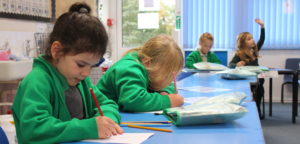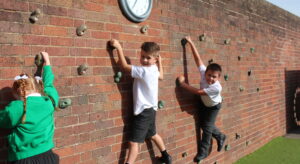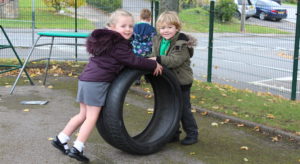At Arden Forest Infant School we pride ourselves on providing an exciting and engaging curriculum for all children, that inspires them to develop a passion and a love of learning. Our aim is to nurture happy, successful and independent life-long learners with healthy minds, bodies and spirit.

We firmly believe the driving force behind the delivery of a broad and balanced inspirational curriculum for all learners, is a clear focus on excellent teaching and learning which ensures all children engage in a range of learning experiences which are challenging, real life and meaningful. Responding to children’s individual learning needs, specific requirements and learning styles.

Planning for teaching and learning ensures that our children are;
At Arden Forest we are continually reviewing our curriculum in order to ensure that our children receive an education that is relevant to the world in which they live.
At Arden Forest Infant School we have Purpose and Rationale documents which give information about intent for each of the curriculum subject areas.
Our whole school curriculum is delivered through termly topics which are underpinned by key concepts. The key concepts focus on developing an understanding specific personal characteristics and relationships. Our bespoke curriculum has been carefully chosen to meet the needs of the children and engage them in their learning. We greatly value the acquisition of knowledge and the development of skills throughout the curriculum.
In Maths and English, we follow National Guidance and have developed sequences of learning to ensure gaps are identified so children are able to build on prior learning. As a school, we have developed Progression in Knowledge and Skills documents to ensure continuity from Early Years to Year Two, in all subject areas. Parents/Carers will be sent their child’s knowledge organisers at the start of each term to inform topic to support their vocabulary and understanding. These can also be found below.
High quality daily teaching, together with differentiated support for small group or individual needs, is implemented in all classes in line with our inclusive offer. Evidence based interventions are also utilised to target specific gaps or areas of need in learning for small groups and individuals. These are delivered by experienced Teachers and Teaching Assistants.
We teach the Warwickshire Agreed Syllabus for Religious Education which focuses on six main world religions. Our Relationships, Health and Sex Education is taught through the ‘PSHE Association’ programme.
To enhance our curriculum further and provide the children with rich cultural experiences, visitors to schools, visits to museums, art galleries, local areas, places of business and worship take place at regular intervals throughout children’s time at Arden Forest.
National testing is undertaken as in line with Government procedures.
In Reception, teachers complete the ‘Reception Baseline Assessments’ within the first six weeks of starting Reception.
In Year One, children’s phonic knowledge and decoding skills are assessed through the ‘Phonic Screening Checks’ which take place in June each year.
In English and Maths, children are assessed against the statutory Teacher Assessment Framework statements at the end of Years 2.
For foundation subjects, children are assessed at the end of every topic against learning outcomes taken from the National Curriculum.
Early Years have developed milestone descriptors based on curriculum statements to assess children in Reception each term. This is a ‘best fit’ model that reflects a child’s learning in a holistic way and allows planning for the next steps in their development.
Subject leaders regularly review the impact of teaching and learning and monitor gaps in learning.
Arden Forest Infant School we put reading at the heart of all our learning. We know that a love and knowledge of books improves pupils’ engagement in life-long learning. As such, the pupils are provided with a variety of reading opportunities, including:
We follow the ‘Bug Club’ phonics scheme to teach phonics. This is a systematic synthetic phonics programme and whole school approach which ensures consistency in teaching phonics and early reading from reception to Year Two.
The ability to use phonic knowledge and skills enables children to segment and blend whole words, which then can be used to read sentences and texts. Pupils’ read phonics phase books which are fully decodable, both in school and at home. Daily phonics sessions of 20-30 minutes are grouped so that every child is working at an appropriate level of challenge. Pupils are assessed half-termly to ensure that they are making a good level of progress in phonics and are working within the appropriate phonics group.
 At Arden Forest Infant School, our personal, social and health education (PSHE) curriculum aims to develop skills and attributes such as; resilience, self-esteem, risk management, team work and critical thinking, which enables our children to become healthy, independent and responsible citizens of the future.
At Arden Forest Infant School, our personal, social and health education (PSHE) curriculum aims to develop skills and attributes such as; resilience, self-esteem, risk management, team work and critical thinking, which enables our children to become healthy, independent and responsible citizens of the future.
Our PSHE curriculum helps our children to understand how they are developing personally and socially, and tackles many of the moral, social and cultural issues that are part of growing up. We encourage the development of emotional intelligence and the ability to articulate their feelings in order to maintain good mental health as well as understanding the importance of their physical health and being healthy.
At Arden Forest we also provide our children with opportunities for them to learn about rights and responsibilities and appreciate what it means to be a member of a diverse society, growing tolerance and respect, children are also encouraged to develop their sense of self-worth and empathy by playing a positive role in contributing to school life and the wider community.
At Arden Forest Infant School, we have embraced the Protective Behaviours Framework to develop the children’s knowledge and understanding of how they can keep themselves safe.
The framework for personal safety consisting of 2 Themes and 7 Strategies. This is a dynamic, confidence building, empowering approach that links safety with having adventures and taking risks.
Protective Behaviours is based on two key themes:
Theme 1: ‘We all have the right to feel safe all the time’.
We explore this theme in detail, carefully looking at the connection between rights and responsibilities. We discover for ourselves the difference between feeling safe, fun to feel scared, risking on purpose and feeling unsafe. These differences are manifested by what we call our ‘Early Warning Signs (EWS), specific bodily responses which tell us when we do not feel safe.
Theme 2: ‘We can talk with someone about anything even if it’s awful or small’.
The children create a ‘hand network’ which represents their own personal networks of support, those people they could turn to if in need. They are reminded and encouraged of the benefits of talking and we explore qualities we would like somebody on our network to embody e.g. an active listener.
The Seven Strategies
These are the 7 different ways in which the PB themes and ideas are practised:
The ‘Taking Care’ scheme is a series of lessons founded on the principles of Protective Behaviours which aims to provide children with strategies: to help keep them feeling safe; to understand their feelings; and how to respond to them and to develop a sense of self-empowerment. This is delivered in the second half of the Autumn Term from Reception to Year 2, however we encourage all staff and children to use PBs in their daily lives.

We have created a bespoke programme of teaching and learning that is based on a skills based curriculum that is knowledge rich. It is progressive across each subject area and across the Year Groups. We have developed a curriculum that reflects and identifies with their locality, giving our pupils a sense of identity, understanding of their environment and has cultural capital.
Knowledge organisers are a summary of the key facts and essential knowledge that pupils need about a unit of work or a curriculum subject for the term. All the information has been broken down into easily digestible chunks which provide the key points of knowledge. They set out an expectation of what pupils should learn about a topic.
Knowledge organisers can help parents to be more aware of what your child/children are learning at school. Therefore, they can be used to support your child’s learning through revision and quizzing them, using their knowledge organisers.
At Arden Forest as understand and value smooth transition between the different key stages as well as transition into and out of our school. Dedicated time helps enable children emotionally, socially and academically.
Please view the following documents for further details.